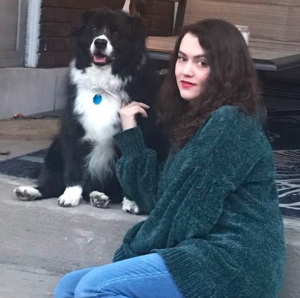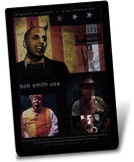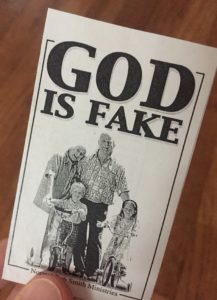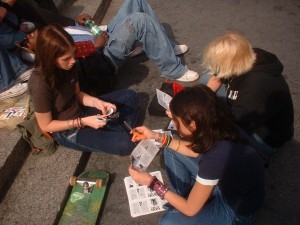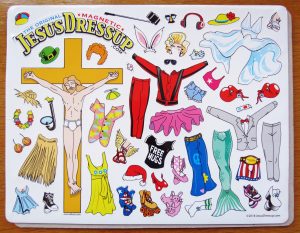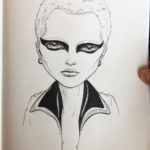Last month I was interviewed by Rebecca Marsh for her thesis project. At the end of it I realized I was answering a lot of questions to myself as well. So I thought it might be of interest to some of you too.
Becka:I appreciate very much all your help in answering my questions. My interest in your work as well as with the totality of the project is to explore atheistic doubt and how it manifest in contemporary society. There is a lot of interesting things to say about your work specifically in that regard: commercialization and production, pop culture and cultural resonance, appropriation of religious iconography as historical and cultural critique, and I could go on.
It’s a common story; children brought up in devout Christian homes only to grow up and away from Jesus: generations of “recovering Catholics.” As someone who didn’t grow up with religion, I’m always curious as to how late-in-life atheists feel their religious upbringing has affected their understanding of religion. How do you feel about religion? Is it good, bad, or neutral? Is it useful or useless? How do you feel religion has impacted your life? How did you come to discover your truth as an atheist?
Bob: What’s so strange about where I’m at now is I’m having a completely new unreligious experience. When I went from believer to atheist in 2000 I was living in Chicago. Then in 2002 I moved to NYC where I lived for 13 years. That’s 20 years living in big cities. In those cities there’s plenty you can surround yourself with that’s completely religion free. Where I’m at now in Michigan Christianity is in every single corner of daily life. It’s unavoidable with anyone I meet and anywhere I go. This is new to me and I’ve been noticing how isolating it really is.
My detest for religion and Christianity in particular has softened from what it once was. I’m not as excitable as I was when I’d come across opposition. I have more sympathy for believers now. A clearer picture of how helpless we all are to indoctrination as children. As I get older I understand more clearly the fear of death and the lack of power we have to avoid the problems and pain life dishes out. A belief in a god helps people think they have some control over these hardships. In my opinion these are the reasons believers resist all doubt. But don’t get me wrong. I’ve had several instances since moving here 3 years ago where I’ve had to defend myself. I’m living with my folks who are 84 and 87 years old. Both devout Christians, and there’s been more than a few occasions where someone’s determined to “share their good news with me”. In those cases I do not hesitate to defend my beliefs, as well as pressure them to defend theirs. But I do not instigate the discussions anymore. I’ve gotten that need out of my system.
Religion has impacted my life in so many ways I could fill up pages and pages talking about it. Without it I would not be as successful as I am today. I’ve been supporting myself with Jesus Dressup for 20 years, and that wouldn’t be if not for religion. And being a converted atheist I have a clearer understanding of the importance of non-belief. I don’t think atheists who’ve been raised by atheists and have always been atheists can appreciate that as much as I can.
Becka: How did you come to get involved in Bob Smith USA? Can you tell me more about how that documentary came to be, at least from your vantage point? How do you interpret Neil Abramson’s vision for this film?
Bob: Neil had seen my site while searching the web for Bob Smiths for his movie. His original idea was to make a documentary about what an American stereotype might be. The name Bob Smith was what he thought might get him there. He told me he was surprised that all of the Bob Smiths he had were super religious in one way or another, and he didn’t want to make a religion-themed film. By that point my website had a substantial audience so I was easy to find. He emailed me asking if I’d like to participate, and after meeting him I had no doubt at all I’d love to have him point a camera at my life. It was good timing too.
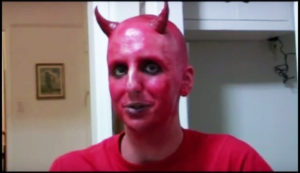
Becka: After watching Bob Smith USA, a scene that struck me was at your parent’s home. It was a cut back and forth of you and your mother talking about your childhood. As you talk, you paint a picture of an overprotective and perhaps mentally unstable mother bearing on your youth. When your mother speaks of your childhood, she focuses on a lack of friends that urged her to take action in your social development. In this moment, the cliché of the angry, rebellious atheist comes to mind. How do you feel about the trope? Is it an accurate portrayal of you? Why or why not?
Bob: Yeah, I was definitely angry. That anger was the fuel I needed to make everything that happened happen. I’ve calmed down since then.
Becka: I absolutely love the “GOD IS FAKE” handouts. In fact, I think the concept of commodifiable and consumable anti-religious objects is brilliant. Appropriating the Church-style of handouts that one often comes across is a thoughtful and provocative performance work. How did this performance work start? Where did your band of Catholic schoolgirl followers come from? Do you still work with performance? Can you tell me about your experience as a performer, especially in New York, and even more especially with such provocative work? What’s the craziest thing someone has done will you were handing out flyers?
Bob: That GOD IS FAKE pamphlet started at Union Square. I was handed one that declared GOD IS REAL, and my friend Venessa threw it back in he person’s face saying “GOD IS FAKE!” That evening I went home and designed it, and the next day I printed them up at my local copy shop, gave them to the skaters and other friends to hand out at the park. And the Unholy Army girls were the friends of those skaters.
It got to the point where I’d come to the park with a stack of uncut sheets of pamphlets, and those girls cut and fold them all, hundreds of them, to hand out to the locals and tourists alike. They even made me a God is Fake cake! After a couple weeks of this the Unholy Army of Catholic School Girls idea developed in my head and the rest was history.
Looking back I wish I had more of a comedic act developed. My performance wasn’t much more than how I’d be without the makeup. I didn’t have it in me at that time. I have no official acting or stage performing background at all, so it was just me being me.
One of the craziest things I did was go to see The Passion of the Christ dressed as Satan. That was intense. That movie’s hype was at its height. Someone threw a drink at me, but no other violence beyond that. It made the papers and became a thing people talked about on the internet. Ahh, those were the days.
Becka: I first became familiar with you through your Dress-up Magnets. I’ve read about the protest at Urban Outfitters as well as the general comments on the Internet. This is a big, crowning artwork, one that gave you a lot of recognition. How did this work come to be? Did you make this for commercial reasons, artistic reasons, maybe both, maybe neither? How do you feel, looking back, about the Dress-up magnets? I know sometimes artists can feel boxed up or reduced when they become known for one, super famous piece. Do you still feel like this is a crowning jewel in your career? Or do you feel your artistic practice has taken on a new shape?
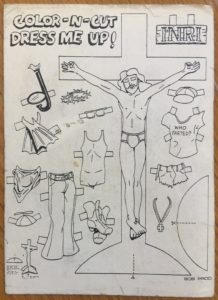
Bob: I first drew that dressup Jesus picture in 1989 while in art school. It was just a black & white line drawing that I photocopied and handed out to people because I thought it was funny. It got a very strong response from everyone who laid their eyes on it. I was a believer at the time, but I didn’t take religion too seriously. Well, not as seriously as most. Then for many years that drawing just sat in my sketchbook as a bookmark.
When the internet came about in the late 90s I became extremely interested in building webpages and showing my art online. The day came where I saw the technology for making a working dressup game using movable layers was possible. This all happened at the same time that my beliefs fell completely apart too. So I taught myself how to build a dressup game online, and everything exploded after that.
I was working full time designing slot symbols for pull tab lottery tickets, but I had the dream of going freelance. As the site got more and more popular I started to see a way I could make that dream happen. If I could find a way to make the game into fridge magnets I was sure they’d be a hit. Problem was, I couldn’t find any place in the United States willing to make them. There were only a handful of die cut magnet manufacturers to choose from, and all of them rejected the project due to the content. I would even find places where the salesman would accept the job, then a week later I’d get my deposit returned and I’d be told it was rejected by some manager, owner, or someone else in the building. It wasn’t until I moved to NYC and found a connection in Hong Kong, and that’s where I’ve been getting them made ever since.
I’m still really proud of Jesus Dressup, and making different versions of it over the years has kept it fresh for me. I refuse to feel boxed in by any past artistic expectations anyone might have of me. If I have an idea I think is worth pursuing I’ll pursue it whether it fits in with what I’ve done before or not.
At the moment I’ve been feeling more stifled by my surroundings than anything else. I have no friends here, which is a huge change from just a few years ago. Plus there’s no hope of me having any kind of a relationship here as long as I’m living with my folks. I’m helping them out and connecting with them after 20 years of running away. But no matter how I word it I’m a 50 year old guy living with his parents. No one’s looking for that.
I hope I continue to have new ideas that people will be interested in, and all I can do is keep putting stuff out there that I think is worthwhile and wait to see if anyone else thinks the same.
Becka: In the “About” section of your website, you make a distinction between “artist,” “atheist,” and “anthropologist.” Under the artist section, you don’t talk about the Jesus Dress-Up and in the anthropologist section, you talk about photographing people and making maps of Union Square. I see a lot of intersection between these three categories, knowing what I do about your career. How do you see your career? Do you see it as three distinct fields? Or do you see it more loosely moving between your interests? How do you see yourself as an artist? I know that you had reservations about claiming the title of artist. Why was that? Do you consider your Dress-up magnets as art? What would you say is a good representation of your artistic practice? What medium do you gravitate towards? What would you say is an emblematic artwork you’ve created (if you could include a picture, if helpful)?
Bob: I do see how all three of those descriptions bleed into each other, but I also see them as distinctly different things. It’s also just 3 catchy words beginning and ending with the same letters that sound neat together. So there’s that too.
Lately I’m easily made to feel insecure about my own talents and future. My 50th is in June, and I’m as human as everyone else. I look around and think, “Is this where I wanted to be? Was that as good as it gets? How long before I’m completely forgotten?” And maybe it’s that voice in my head that’ll spark the next whatever it is I do. I don’t know.
A lot of that insecurity just comes from the fact that I have an older brother who’s a vice president of one of the biggest design firms in North America. Since I was a child I’ve felt I’ll never be as good as him. I used to not be able to impress him with anything I did. But he’s made it clear since then that what I’ve done in regards to my website and business impresses him. He’s even had me autograph magnets for him. But I still think he’s a better artist and more successful than I’ll ever be. Nothing drives me like thinking I’m not good enough. Lately I’ve been making myself draw on a daily basis because I think I’ve got a long way to go.
I do consider Jesus dressup art. I gravitate towards pencil sketch, pen & ink, and Adobe Illustrator. Drawing people so it looks undeniably like them is really important to me. Drawing the people of Union Square for the postcard was excellent practice! I also dabble in writing, photography & videography. I suppose that wording shows my insecurity there too.
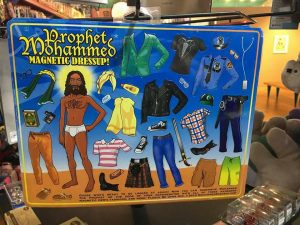
Becka: Jesus Dress-up is quite provocative, especially in 2000’s America. Prophet Mohammed Dress-Up makes Jesus Dress-up look like a conservative joke. Moreover, these came out only days after the Charlie Hebdo shooting. Was this piece in response to the massacre? I can imagine how angry these emails must be, both from the conservatively religious and socially liberal. Do you get a lot of hate for Mohammed Dress-Up? Or do you feel the criticism for Jesus Dress-up is worse? Do you get criticized for political correctness? Do you find more socially liberal or more conservatively religious people critique you? Which is worse?
Bob: I’m not sure if this is common knowledge, but 9/11 sparked most of the anti-religious sentiment around today. I had drawn a Mohammad Dressup before the Charlie Hebdo shooting. But it did indeed break my heart when that happened. The Mohammed magnets came out in 2013, and that shooting happened in 2015.
The first version of Mohammed Dressup I posted online in 2007, and quite honestly it was in response to Christian hate mailers constantly yelling at me “WHY DON’T YOU DO MOHAMMED??”
A lot has changed since I started the site. Between 2000 & 2012 or so (when it was at its peak) being politically correct was a demand made by conservative republicans. TV shows, movies, video games, rock and roll were all criticized by the right for sex & violence, devil worship, corrupt influence on kids, etc. My site was a response to all of that political correctness they were demanding.
I’m disappointed to see now it’s liberals making the PC demands. I think freedom of speech is the most important freedom to defend. It’s the reason most of what I’ve done can exist publicly at all. Watching my team take on tactics of the right has been disheartening.
I hoped that by posting the thousands of hate letters directed at me it would send a message to my liberal brethren that silencing the opposition is not the way to go. It doesn’t work and it discourages thought on both sides. Let people be heard. Let them give their arguments, even their hate. I didn’t even mind the threats. Hurt feelings aren’t reason enough to forbid or criminalize speech. I said it over and over again in my hate mail section, and I still believe that today.
Becka: How do you feel being a white, American man effects the way you participate in religious critique?
Bob: I’m really put off by this idea that it’s perfectly okay, even noble to discriminate against a race or sex as long as they’re white and/or male. I guess I expect my efforts to be fair to others to be reciprocated. Discrimination against any color or gender or sexual preference as a group is wrong. Condoning any of it only adds credence to the concept. Just as men may not understand what being a woman is like, or a white person doesn’t understand what living as a black person is like, so is the reverse. And that in itself should make a person step back and ask themselves “Am I judging this person as the group I choose to associate them with, or who they are as an individual?”
Becka: What do you think about your subject matter and current work? Are you concerned with the universal, personal, both, neither?
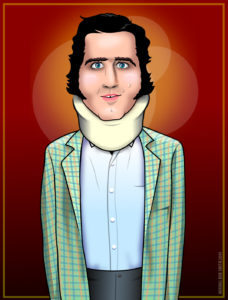
Bob: First off, I appreciate your compliments and feedback. I’m really proud of my work, and the talent I have to produce pictures of this quality. I love being able to illustrate people and capture their likeness in my own style. It was during my high school years I figured out that my idea of what’s beautiful does not fit in with the mainstream. It’s that beauty on the fringe I think deserves more attention and I have a responsibility to pay tribute.
Much of it too is trying to decode whatever it is going on inside my head. A therapeutic exercise to help sort out who I am to myself. And to everyone else, I suppose. That’s what art is.
Becka: The last question may not have come across the way I wanted. I feel that, after reading your response you and I share similar feelings on PC culture. Working in the art world, especially as a curator, I come across PC language a fucking lot. I think it’s important to talk about perspective and all, sure, but what I was really trying to get out of the question was how you feel about visibly being a white man and making this work. Whether or not we agree, this is a HUGELY important thing anymore. How do you feel your identity plays into your work, which it really doesn’t (and shouldn’t, because ideas aren’t preclusive to skin tone, gender, or sexuality).
Bob: I think what I’ve actually been doing since you bring it up, is enjoying not being involved in the fight. There’s enough of pretty much every single opinion being shouted over the airwaves right now, no one yearns for another voice repeating what ten thousand vloggers are already complaining about. It’s sort of the same thing that happened to me at The Square. You sit there and watch protesters of every brand thinking they’re the highest and mightiest voice, and I realized I didn’t have to do anything. Now I can sit back and watch and do art that doesn’t have bold political or religious opinions. Let them have their fight. I’m taking a break for now.
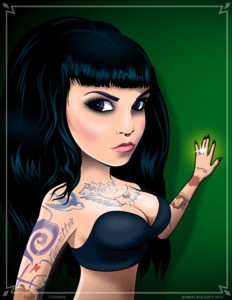 I’ve been taking my sketchbook to the nearest Starbucks (half hour drive away) with an idea of who I’m going to work on. I have several reference photos handy, then I sketch. And I take my time. I’ll spend hours on one sketch. If I think one line is wrong I’ll erase it and try again. If an eye looks a millimeter off I’ll erase the whole thing and try again, all in the name of “practice makes perfect”. My favorite subjects to draw are punk rock & extreme style pretty people, female bodybuilders, trans girls and others who play with androgyny, oddball celebrities I admire, and any combination of these topics. That’s what I like to spend my time illustrating. Then when I have a pencil sketch I think is perfect I finalize it in Adobe Illustrator.
I’ve been taking my sketchbook to the nearest Starbucks (half hour drive away) with an idea of who I’m going to work on. I have several reference photos handy, then I sketch. And I take my time. I’ll spend hours on one sketch. If I think one line is wrong I’ll erase it and try again. If an eye looks a millimeter off I’ll erase the whole thing and try again, all in the name of “practice makes perfect”. My favorite subjects to draw are punk rock & extreme style pretty people, female bodybuilders, trans girls and others who play with androgyny, oddball celebrities I admire, and any combination of these topics. That’s what I like to spend my time illustrating. Then when I have a pencil sketch I think is perfect I finalize it in Adobe Illustrator.
Becka: How do you see this work being shown? Do they exist as digital files? Are they printed, editioned, indefinite? Do you see these as unique works of art or images to be replicated? Do you imagine this work or subsequent work you do in a gallery setting? Or do you see this work existing somewhere else, like online, or commercially?
Bob: These have been the questions on my plate for the last several years. It’s one thing to just make stuff and put it out there for free for people to Like on Facebook, share with friends, and be able to say “I did that.” It’s a whole other thing to actually make that work pay rent. Jesus Dressup gave me the luxury of paying my rent and allowing me to do other things that do not. Like Amazing Strangers and these drawings I’ve shown. They are just digital files with no other purpose than showing off what I love to do.
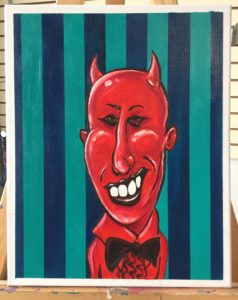
In the last month or so I’ve been yearning to paint. I’m in a position now where I have the time, focus and maturity to really delve into painting. I’ve also been realizing that I need a bigger art project to focus on just to keep my sanity and self-esteem above water. I’ve been looking around for the space to rent to actually do real oil painting. I don’t have that right now, but I hope to make it happen this year. It’s a big, bold endeavor for me. I have no idea at all if there’s any sort of demand out there for paintings by Normal Bob Smith. Most painters I know have rooms full of paintings that no one really wants to buy, but I feel like I have to do it. No joke. I’m being woken up by panic attacks most mornings fearing that I’m disappearing, becoming irrelevant, and most importantly not being able to make a living in the years to come. Turning 50 in June has a lot to do with this, I’m sure.
Becka: Who are some artists you look up to? Who or what do you feel has been greatly influential to your current work?
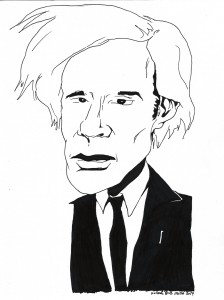
Bob: I love Andy Warhol. What he did in his lifetime influenced me in many ways. His ability to move from commercial to gallery, fringe to mainstream. His attitude, and using the world and people around him. His sarcasm, style and celebrity. I know it’s not the most original pick, but Warhol really influenced much of what I’ve done.
Rebecca Marsh
Curatorial Fellow, MA School of Visual Arts
beckajean.com

